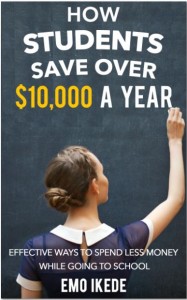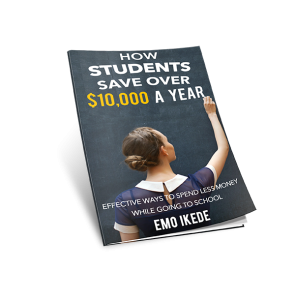Loans, credit cards, limited funds and debt. These seem to be a common theme with a lot of students these days. The ever increasing price of tuition, text books, food, accommodation and just about everything else can add a little more stress to the life of a student.
The goal of this post is to look at the realities that students face today, address some of the common financial pitfalls they may encounter and suggest ways to manage or avoid them altogether.
As soon as most students are accepted into university or college, the students loans and credit card applications start coming in the mail, and before they know it, they have access to a lot of credit without having enough time to understand the long term effects of taking on the debt.
As a student, you still have to think about how to finance your education, accommodation, food, entertainment etc. (loans, part-time jobs, parents). The key here is to make sure that your expenses are as low as possible, and you only buy what you need.
A few Expense Traps to Avoid:
One of the big pitfalls is using your student loans for things other than school, i.e. car, trips, purchasing big ticket items in general (i.e. a high end computer or an expensive cell phone package (when a basic one will do). The smart thing to do is to think of each expense as adding to what you have to pay back (with interest) when you graduate, therefore keeping your expenses as low as possible is your best option.
Another pitfall would be not considering the total amount of a student loan you should get based on your earning potential when you graduate. A quick search online for the earning potential of new graduates for example show that students who study commerce, engineering, IT, Dentistry or Medicine would probably have a much higher starting salary than someone in liberal arts and/or music. This is something to seriously consider if you are looking at taking out a $50,000 student loan when you can only reasonably expect to earn $36,000 a year.
The breakdown bellow shows the realities of making monthly payments on a $50,000 loan from an annual income of $36,000 ($3000 a month before taxes and deductions).
- Monthly Income $3000.00
- Federal tax deduction $276.98
- Provincial tax deduction $219.81
- Total Tax deductions $496.79
- CPP deductions $134.06
- EI deductions $53.40
- Total Deductions $684.25
- Net Amount $2,315.75 (actual take home pay)
So of that $2315.75, you still have to pay rent ($800), food ($400), transportation ($100), utilities/misc (laundry, clothes, other necessities) ($250) which would be approximately $1750.00, leaving you with $565.75 for entertainment and everything else. If you pay about $350 per month, it would take you more than 18 years to pay off your student loan.
Things you can start doing immediately:
1. Always look for ways to reduce or cut out expenses (see “Find Savings Now” link above for ideas). Remember, what you save now = what you don’t have to pay later (with additional interest). For example you if you rent an apartment all by yourself, consider shared accommodations with a compatible roommate.
2. Try to find out all the businesses that offer discounts to students in your area, so that you can use them to save money.
3. Get a part-time job to help reduce the amount of money you have to borrow while you are in school. (The key is to make sure you do not take on more hours/shifts at the expense of your education).
4. Seek credit counseling or financial help as soon as you think you are getting in over your head.
5. Try to see if you can start saving a little money for your “rainy-day” fund. It is a great habit to start.
* assumption = 5% annual rate compounded annually.
Emo Ikede & Lora Archer.
CANADIAN TAX INFORMATION for INTERNATIONAL STUDENTS (Revenue Canada)
I published the book below (How Students Save Over $10,000 a Year) to help students save money. Consider purchasing a copy for easy to follow instructions to reduce your expenses.
AMAZON
SMASHWORDS



Short, sweet, to the point, FREE-exactly as infromation should be!
Loved the book! Just the right length and tone to get it’s point across, while keeping me interested. Would definitely recommend it to high school students or anyone considering a college education!
Hi Emo, great presentation today in NSCC Institute of Technology Campus.
As requested, I would like to share this website, in which you can buy some books in internationational versions, that will normally differ from the regular ones for the finishing (Hard cover x soft cover), for a fraction of the national (Canadian) version.
http://www.abebooks.com
Good savings!